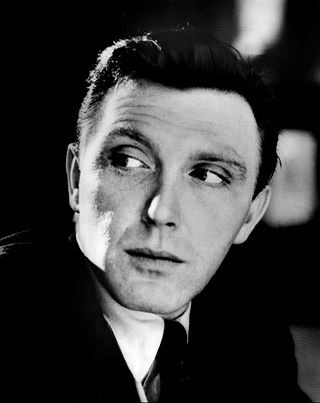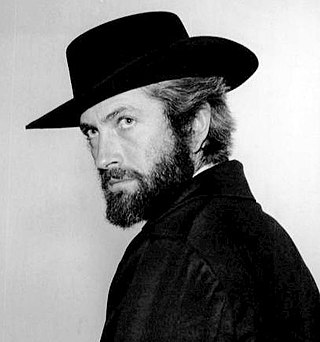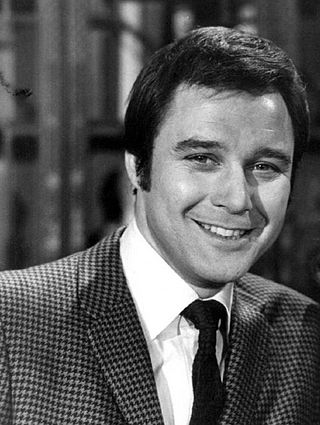Related Research Articles

Sorrell Booke was an American actor who performed on stage, screen, and television. He acted in more than 100 plays and 150 television shows, and is best known for his role as corrupt politician Jefferson Davis "Boss" Hogg in the television show The Dukes of Hazzard.
Denver Dell Pyle was an American film and television actor and director. He was well known for a number of TV roles from the 1960s through the 1980s, including his portrayal of Briscoe Darling in several episodes of The Andy Griffith Show, as Jesse Duke in The Dukes of Hazzard from 1979 to 1985, as Mad Jack in the NBC television series The Life and Times of Grizzly Adams, and as the titular character's father, Buck Webb, in CBS's The Doris Day Show. In many of his roles, he portrayed either authority figures, or gruff, demanding father figures, often as comic relief. Perhaps his most memorable film role was that of Texas Ranger Frank Hamer in the movie Bonnie and Clyde (1967), as the lawman who relentlessly chased down and finally killed the notorious duo in an ambush.

Ralston Purina Company was a St. Louis, Missouri,–based American conglomerate with substantial holdings in animal feed, food, pet food, consumer products, and entertainment. On December 12, 2001, it merged with Swiss food-giant Nestlé's Friskies division to form Nestlé Purina PetCare Company.

Robert Lansing was an American stage, film, and television actor.

John Drew Barrymore was an American film actor and member of the Barrymore family of actors, which included his father, John Barrymore, and his father's siblings, Lionel and Ethel. He was the father of four children, including actor John Blyth Barrymore and actress Drew Barrymore. Diana Barrymore was his half-sister from his father's second marriage.

Chex is an American brand of breakfast cereal currently manufactured by General Mills. It was originally known as Shredded Ralston, first produced in 1936 and owned by Ralston Purina of St. Louis, Missouri, then later renamed Chex in 1950. The Chex brand went with corporate spinoff Ralcorp in 1994 and was then sold to General Mills in 1997. Rival cereal company Kellogg's has the rights to the Chex brand in South Korea and Singapore.

Lloyd Benedict Nolan was an award-winning American stage, film and television actor who rose from a supporting player and B-movie lead early in his career to featured player status after creating the role of Captain Queeg in Herman Wouk's play The Caine Mutiny Court-Martial in the mid-1950s. Nolan won a Best Actor Emmy Award reprising the part in 1955 TV play based on Wouk's classic tale of military justice.

Gloria Talbott was an American film and television actress.

Michael Callan, sometimes known as Mickey Collins, was an American actor best known for originating the role of Riff in West Side Story on Broadway, and for his film roles for Columbia Pictures, notably Gidget Goes Hawaiian, The Interns and Cat Ballou.

Grant Williams was an American film, theater, and television actor. He is best remembered for his portrayal of Scott Carey in the science fiction film The Incredible Shrinking Man (1957), and for his starring role as Greg MacKenzie on Hawaiian Eye from 1960 through 1963.

Janet Blair was an American big-band singer who later became a popular film and television actress.
The Play of the Week is an American anthology series of televised stage plays which aired in NTA Film Network syndication from October 12, 1959 to May 1, 1961.
The Brothers Brannagan is an American detective television series that aired in syndication from September 14, 1960, to October 2, 1965.
Lee Robinson was an Australian producer, director and screenwriter who was Australia's most prolific filmmaker of the 1950s and part of the creative team that produced the late 1960s international hit television series Skippy the Bush Kangaroo.

Nina Shipman is a retired American film and television actress. Shipman is a member of the Shipman show business family.

Roberta Haynes was an American actress who was active from 1947 until 1989.
"The Tunnel" was a pre-recorded American television play first broadcast on December 10, 1959, as part of the CBS television series, Playhouse 90. It was the sixth episode of the fourth season of Playhouse 90 and the 123rd episode overall.

John Vivyan was an American stage and television actor, who was best known for portraying the title character in the television series Mr. Lucky.

Patricia Huston was an American stage, film, and television actress. She had an explosive early career from 1958 to 1968, went through a twenty-year period with no acting work, and resumed her career with several recurring roles on popular shows during the last ten years of her life.

John Bryant was a prolific American actor active from 1944 through 1969. He performed in the famous G.I. version of Hamlet, both in the Central Pacific Theater during World War II and later on Broadway. He also acted in films, but was most prevalent on television, playing many lead and character parts including a five-year recurring role as Dr. Carl Spalding on The Virginian.
References
- 1 2 3 4 Brooks, Tim; Marsh, Earle F. (June 24, 2009). The Complete Directory to Prime Time Network and Cable TV Shows, 1946-Present. Random House Publishing Group. p. 711. ISBN 978-0-307-48320-1 . Retrieved December 10, 2023.
- ↑ Shanley, John P. (September 6, 1959). "A New TV Season: : Many Big Productions Planned by Networks" . The New York Times. p. X 11. Retrieved December 10, 2023.
- 1 2 3 "John Gunther's 'High Road' To Premiere". Daily News-Post. California, Monrovia. August 22, 1959. p. 12. Retrieved December 11, 2023– via Newspapers.com.
- ↑ "John Gunther's High Road Gives View Of Cuba". The Times-Mail. Indiana, Bedford. September 26, 1959. p. 14. Retrieved December 10, 2023– via Newspapers.com.
- 1 2 Shepard, Richard F. (August 31, 1959). "TV Role Is Barred by Mrs. Roosevelt" . The New York Times. p. 43. Retrieved December 10, 2023.
- ↑ "Gunther's High Road Leads To Togoland". The Times-Mail. September 19, 1959. p. 14. Retrieved December 11, 2023– via Newspapers.com.
- ↑ "This Week -- Network Debuts & Highlights". Ross Reports. September 7, 1959. p. 73. Retrieved December 11, 2023.
- 1 2 3 4 Shepard, Richard F (September 12, 1959). "Truman to Give Show on Wilson" . The New York Times. p. 43. Retrieved December 10, 2023.
- ↑ Adams, Val (June 6, 1960). "TV Sponsor to Aid Local Education" . The New York Times. p. 59. Retrieved December 11, 2023.
- ↑ "Harris faculty member wins educational tour". St. Louis Post-Dispatch. April 1, 1960. p. 3 E. Retrieved December 11, 2023– via Newspapers.com.
- ↑ "Radio-TV". Jet. September 10, 1959. p. 66. Retrieved December 10, 2023.
- ↑ "Tour Exotic Jamaica Next Week". The Lima News. December 19, 1959. p. 18. Retrieved December 11, 2023– via Newspapers.com.
- ↑ "Radio-TV". Jet. March 17, 1960. p. 66. Retrieved December 10, 2023.
- ↑ "John Gunther's High Road Leads To 'Forgotten Land'". The Times-Mail. Indiana, Bedford. April 2, 1960. p. 11. Retrieved December 11, 2023– via Newspapers.com.
- 1 2 3 "John Gunther's High Road". Broadcasting. September 28, 1959. p. 46. Retrieved December 11, 2023.